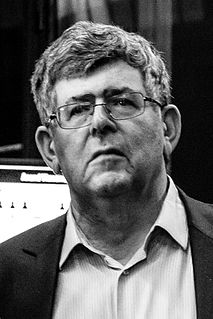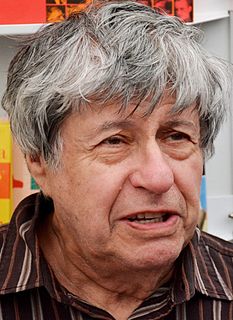A Quote by Samuel Johnson
Consultation and compliance can conduce little to the perfection of any literary performance; for whoever is so doubtful of his own abilities as to encourage the remarks of others, will find himself every day embarrassed with new difficulties, and will harass his mind, in vain, with the hopeless labour of uniting heterogeneous ideas, digesting independent hints, and collecting into one point the several rays of borrowed light, emitted often with contrary directions.
Quote Topics
Any
Borrowed
Collecting
Compliance
Consultation
Contrary
Day
Difficulties
Directions
Doubtful
Embarrassed
Encourage
Every
Every Day
Find
Himself
Hints
His
Hopeless
Ideas
Independent
Labour
Light
Literary
Little
Mind
New
Often
Others
Own
Perfection
Performance
Point
Rays
Remarks
Several
Uniting
Vain
Whoever
Will
Related Quotes
He that condemns himself to compose on a stated day will often bring to his task attention dissipated, a memory embarrassed, an imagination overwhelmed, a mind distracted with anxieties, a body languishing with disease: he will labour on a barren topic till it is too late to change it; or, in the ardour of invention, diffuse his thoughts into wild exuberance, which the pressing hour of publication cannot suffer judgment to examine or reduce.
..every Man has a Property in his own Person. This no Body has any Right to but himself. The Labour of his Body, and the Work of his Hands, we may say, are properly his. .... The great and chief end therefore, of Mens uniting into Commonwealths, and putting themselves under Government, is the Preservation of their Property.
Whilst a man is persuaded that he has it in his power to contribute anything, be it ever so little, to his salvation, he remains in carnal self-confidence; he is not a self-despairer, and therefore is not duly humbled before God, he believes he may lend a helping hand in his salvation, but on the contrary, whoever is truly convinced that the whole work depends singly on the will of God, such a person renounces his own will and strength; he waits and prays for the operation of God, nor waits and prays in vain
A Christian should put away all defense and make no attempt to excuse himself either in his own eyes or before the Lord. Whoever defends himself will have himself for his defense, and he will have no other. But let him come defenseless before the Lord and he will have for his defender no less than God Himself.
Good work is no done by "humble" men. It is one of the first duties of a professor, for example, in any subject, to exaggerate a little both the importance of his subject and his own importance in it. A man who is always asking "Is what I do worth while?" and "Am I the right person to do it?" will always be ineffective himself and a discouragement to others. He must shut his eyes a little and think a little more of his subject and himself than they deserve. This is not too difficult: it is harder not to make his subject and himself ridiculous by shutting his eyes too tightly.
Do you think it is a vain hope that one day man will find joy in noble deeds of light and mercy, rather than in the coarse pleasures he indulges in today -- gluttony, fornication, ostentation, boasting, and envious vying with his neighbor? I am certain this is not a vain hope and that the day will come soon.
Whoever is wise is apt to suspect and be diffident of himself, and upon that account is willing to "hearken unto counsel"; whereas the foolish man, being in proportion to his folly full of himself, and swallowed up in conceit, will seldom take any counsel but his own, and for that very reason, because it is his own.
Often you will find the opposite situation. The author seems to have interesting ideas, but he is not able to illustrate them with decent examples. If a grandmaster is commenting on one of his own games, then there is usually not any problem: his general thoughts are closely tied up with what is happening on the board. But as soon as he starts writing an article or book on a different theme the difficulties begin, as he may not have suitable material to hand.
No man, however enslaved to his appetites, or hurried by his passions, can, while he preserves his intellects unimpaired, please himself with promoting the corruption of others. He whose merit has enlarged his influence would surely wish to exert it for the benefit of mankind. Yet such will be the effect of his reputation, while he suffers himself to indulge in any favourite fault, that they who have no hope to reach his excellence will catch at his failings, and his virtues will be cited to justify the copiers of his vices.
Whoever is truly humbled — will not be easily angry, nor harsh or critical of others. He will be compassionate and tender to the infirmities of his fellow-sinners, knowing that if there is a difference — it is grace alone which has made it! He knows that he has the seeds of every evil in his own heart. And under all trials and afflictions — he will look to the hand of the Lord, and lay his mouth in the dust, acknowledging that he suffers much less than his iniquities have deserved.
I often ask myself, 'Who would Jesus vote for?' Then I start to think that he wouldn't vote at all; however, it would not be out of apathy or disinterest, but out of perfection and light. As a miracle worker, I think he would, by the power of God's teachings, the perseverance and the truth, influence in a modern sense whoever is put into office how to best serve his fellow men. One, like his skeptics, may find that impractical. But there is a message in that no man in power can slow the momentum of the will of God, and the miracles of his teachings will be forever victorious.
Every few seconds a new book sees the light of day. Most of them will just be a part of the hum that makes us hard of hearing. Even the book is becoming an instrument of forgetting. A truly literary work comes into being as its creator's cry of protest against the forgetting that looms over him, over his predecessors and his contemporaries alike, and over his time, and the language he speaks. A literary work is something that defies death.




































